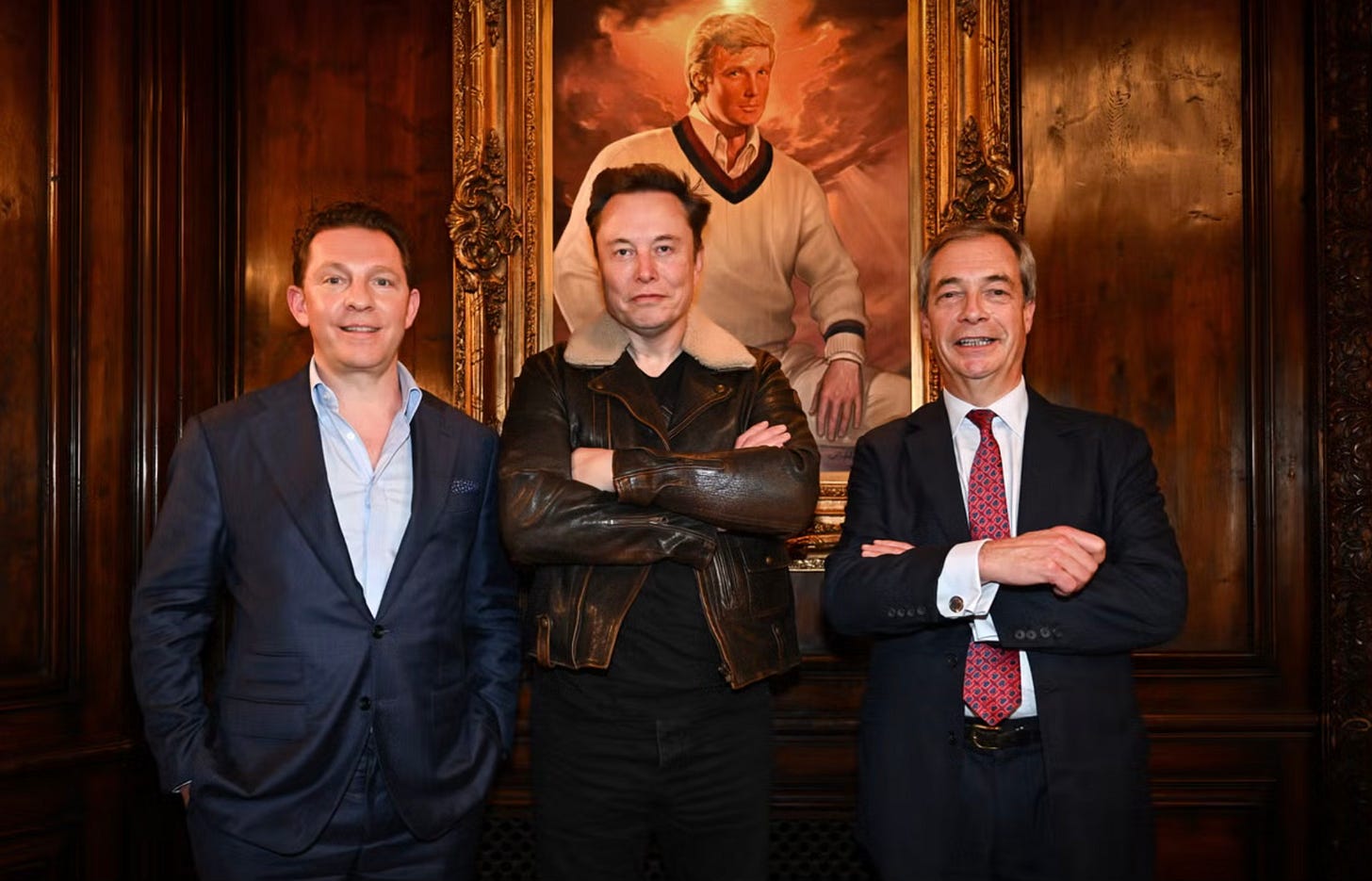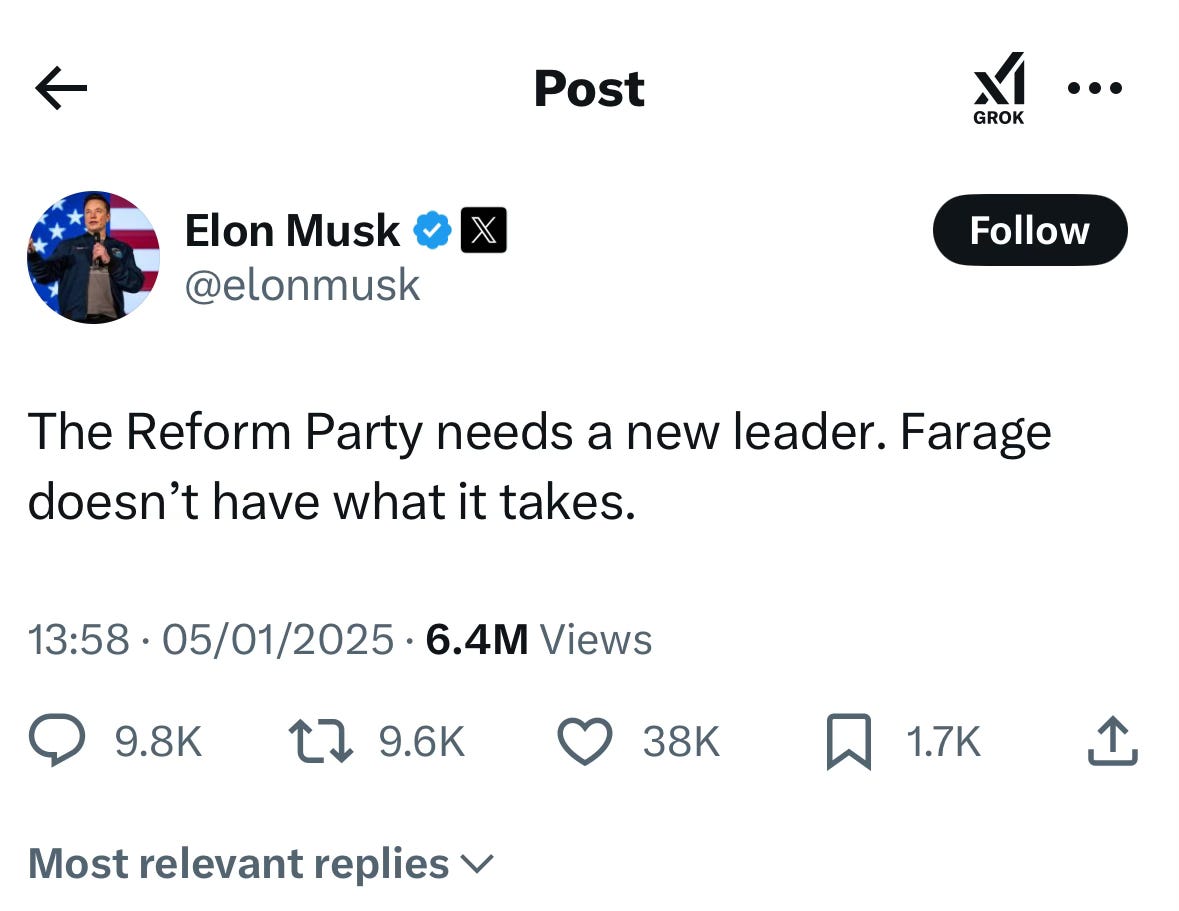
‘The UK is becoming a tyrannical police state,’ Elon Musk declared in a recent tweet (Musk, 2024), igniting a firestorm of outrage and plunging himself into the heart of British political discourse. Musk’s remarks about grooming gangs, his inflammatory accusations against Labour MP Jess Phillips, and his critiques of Prime Minister Keir Starmer have forced UK politics into the global spotlight.
This article unpacks the implications of Musk’s provocative engagement: from his amplification of controversial narratives to his alignment with far-right figures like Tommy Robinson, and the broader questions it raises about billionaire influence on democratic systems. It also scrutinizes Starmer’s silence in the face of Musk’s rhetoric, questioning what this means for Labour, public trust, and the UK's political future.
Musk's Comments and the Grooming Gang Controversy
Musk’s recent retweet of the far-right Tommy Robinson’s documentary, The Rape of Britain, which makes unverified claims about grooming gangs, exemplifies his provocative engagement with UK politics. Musk followed this by calling for Robinson’s release from prison, where he is serving an 18-month sentence for contempt of court (Elgot, 2024). These actions underscore Musk’s willingness to amplify divisive rhetoric, positioning himself as a champion of free speech while simultaneously aligning with controversial figures like Robinson.
The grooming gang issue is a deeply sensitive topic in the UK. Musk's framing of it through Robinson’s lens has reignited debates around race, class, and accountability. Critics argue that Musk’s comments are not only lacking nuance but also fundamentally incorrect, given the unsubstantiated claims presented in Robinson’s documentary. By amplifying such inaccuracies, Musk risks inflaming tensions, particularly as Robinson’s version of activism has long been associated with far-right extremism.
Musk's Remarks About Jess Phillips
In addition to his comments on grooming gangs, Musk launched a personal attack on Labour MP Jess Phillips, calling her a ‘rape genocide apologist’ and stating that she ‘deserves to be in prison’ (BBC News, 2025). Phillips, who represents Birmingham Yardley and is known for her outspoken advocacy on women's rights, has often clashed with opponents over controversial issues such as domestic violence legislation and grooming gang accountability. Musk’s remarks not only target Phillips personally but also contribute to a broader culture of hostility toward outspoken women in politics. He posted on X: ‘The real reason she's [Ms Phillips] refusing to investigate the rape gangs is that it would obviously lead to the blaming of Keir Starmer (head of the CPS at the time)’ (Apple News, 2025).
These comments have sparked widespread criticism, with many viewing them as a troubling escalation in the toxicity of public discourse. Phillips, admired by her supporters for her tenacity, has faced significant backlash for her confrontational approach, making her a polarizing figure. Musk’s intervention further complicates this dynamic, as it intertwines his rhetoric with broader issues of misogyny and political accountability.
Starmer’s Silence
Despite Musk’s inflammatory remarks, Prime Minister Keir Starmer has remained notably silent. His lack of response to Musk’s comments about grooming gangs, Jess Phillips, and broader UK politics has raised yet more questions about his leadership. This silence takes on a particularly grave significance in light of the assassinations of Labour MP Jo Cox in 2016 and Conservative MP David Amess in 2021. Allowing Musk to make such extreme and inflammatory accusations surely puts MPs at higher risk, as the normalization of hostile rhetoric can contribute to a dangerous political climate.
Critics argue that Starmer’s hesitation to confront Musk represents a missed opportunity to assert his authority and defend democratic principles. The response to Musk’s comments has largely been left to Wes Streeting, the Health Secretary, who dismissed Musk's statements as ‘ill-informed’ and ‘a ridiculous thing to say’ (BBC News, 2025). While Streeting’s rebuttal attempts to counter Musk’s inflammatory rhetoric, the absence of direct intervention from Starmer leaves a noticeable leadership vacuum. This silence risks validating Musk’s criticisms of Labour while eroding public trust in Starmer’s ability to lead decisively. Moreover, his silence emboldens the far right, as it creates the impression that Starmer either has something to hide—given his former role as Director of Public Prosecutions (an accusation already thrown at him by Musk)—or is simply uninterested in addressing these critical issues. Compared to other global leaders, such as those in Australia who have taken proactive measures to regulate social media platforms (Australian Government, 2025), Starmer’s inaction appears weak. His reluctance to challenge Musk sets a dangerous precedent for unchecked billionaire influence in UK politics.
Reform UK Responses: Farage and Tice
Nigel Farage, leader of Reform UK, has adopted a more nuanced stance toward Musk's controversial grooming gang comments. Asked about Musk’s comments, Farage remarked, ‘Tough things get said... by both sides of the debate.’ However, this statement risks sanitizing the extreme and inflammatory accusations Musk has made, such as referring to Jess Phillips as a ‘genocidal rape apologist.’ He added, ‘This man happens to be the richest man in the world, but equally, the fact that he's bought Twitter now actually gives us a place where we can have a proper open debate about many things... We may find it offensive, but it's a good thing, not a bad thing’ (BBC News, 2025). However, this assertion overlooks the fact that X, under Musk’s ownership, is no longer moderated and is now rife with extreme content. Musk’s role as the ultimate arbiter of content also undermines the premise of a ‘proper debate.’
Meanwhile, Richard Tice, Deputy Leader of Reform UK, claimed there has been a ‘massive, massive cover up’ of a ‘horrific grooming gangs scandal’ by people of ‘mainly Pakistani heritage.’ Tice stated: ‘This has taken place over decades and authorities, care workers, police workers, the British establishment, senior politicians,’ adding that, ‘the mainstream media have turned the other way. And there has been a sort of, “this doesn't suit us because we want massive immigration, we want diversity, and this is inconvenient.” So we won't explore it’ (Apple News, 2025). Tice’s statements offer a full-throated backing of these narratives, allowing Farage to distance himself from direct controversy while maintaining Reform UK’s alignment with these dog-whistle politics.
Adding to this internal tension, Elon Musk recently tweeted that Reform UK ‘needs a new leader’ and that Farage ‘does not have what it takes’ (BBC News, 2025). This comment, surely a slap in the face to Farage—who had previously praised Musk as a ‘hero’—comes in the wake of Farage seemingly distancing himself from Musk’s controversial remarks. Musk’s intervention could signal a fuller backing of figures like Tommy Robinson, further complicating Farage’s leadership and casting doubt on the unity within Reform UK. It also raises questions about whether Musk will continue to back Reform UK with Farage as its leader, especially given Farage’s attempts to distance himself from Musk’s initial comments.
The Broader Implications of Musk’s Interference
Musk’s foray into UK politics highlights the growing concern about the influence of billionaires on democratic systems. His ability to dominate public discourse and amplify divisive narratives underscores the vulnerabilities of political institutions to external manipulation. Musk’s comments on grooming gangs, Phillips, and Starmer reveal a pattern of intervention that risks normalizing extreme rhetoric while sidelining constructive debate.
If left unchallenged, Musk’s actions could reshape the UK’s political landscape, undermining the credibility of democratic institutions. The intersection of wealth, power, and influence in politics demands urgent attention to prevent individuals like Musk from wielding disproportionate control over public discourse.
Conclusion: The Musk Conundrum and Starmer’s Missed Opportunity
Elon Musk’s unexpected entry into British politics has exposed a stark and unsettling truth: the fragility of democracy when faced with the unchecked power of billionaires. His inflammatory remarks about grooming gangs, his accusations against Jess Phillips, and his criticisms of the UK government are not mere provocations; they are an assault on the principles of accountability, truth, and equality that underpin a functioning democracy.
Prime Minister Keir Starmer’s silence in the face of Musk’s interference is deafening. By failing to address these incendiary comments, Starmer risks being seen as complicit or, worse, ineffective. The consequences of his inaction are not abstract—they are tangible and immediate, emboldening far-right voices and normalizing extremist narratives. What does it say about the state of UK politics when the Prime Minister cannot—or will not—stand up to the influence of a foreign billionaire?
The media, too, bears a share of the responsibility. By amplifying Musk’s rhetoric without critical interrogation, they contribute to a toxic environment where lies and fear-mongering thrive. This failure to challenge misinformation is not just a lapse in judgment; it is a betrayal of the public trust.
The ‘Musk Effect’ is not just a wake-up call—it is a test of the UK’s resilience in safeguarding its democratic principles. As Musk continues to shape public discourse, the question remains: will leaders take decisive action, or will they allow wealth and influence to dictate the political future? The decisions made today will echo far beyond our lifetime, shaping the kind of society we leave for generations to come.
References
Apple News (2025) ‘Musk’s remarks spark debate in UK politics,’ Apple News, January. Available at: https://apple.news/AQbt4gEE3TkmCc4GzkWlumg (Accessed: 4 January 2025).
Elgot, J. (2024) ‘Elon Musk calls for release of Tommy Robinson from prison,’ The Guardian, 2 January. Available at: https://www.theguardian.com/uk-news/elon-musk-tommy-robinson (Accessed: 4 January 2025).
BBC News (2025) ‘Musk’s comments spark controversy in UK politics,’ BBC News, 3 January. Available at: https://www.bbc.co.uk/news/articles/cd9x3d4v7jdo (Accessed: 4 January 2025).
BBC News (2025) ‘Musk's grooming gangs attack on Phillips 'disgraceful smear,' says Streeting,’ BBC News, 5 January. Available at: https://www.bbc.co.uk/news/articles/c23vdp4y1p0o (Accessed: 5 January 2025).
Sky News (2025) ‘Controversies surrounding grooming gangs,’ Sky News, 4 January. Available at: https://www.skynews.com/grooming-gangs (Accessed: 4 January 2025).
Yahoo News (2025) ‘Farage stokes controversy over riots,’ Yahoo News, 5 January. Available at: https://www.yahoo.com/news/farage-riots-controversy (Accessed: 4 January 2025).
Australian Government (2025) ‘Social media platform regulation: Lessons from global implementation.’ Available at: https://www.australia.gov.au/social-media-regulation (Accessed: 4 January 2025).
BBC News (2025) ‘Elon Musk says Reform UK needs a new leader, criticizes Nigel Farage,’ BBC News, January. Available at: https://www.bbc.co.uk/news/reform-uk-leadership (Accessed: 5 January 2025).




